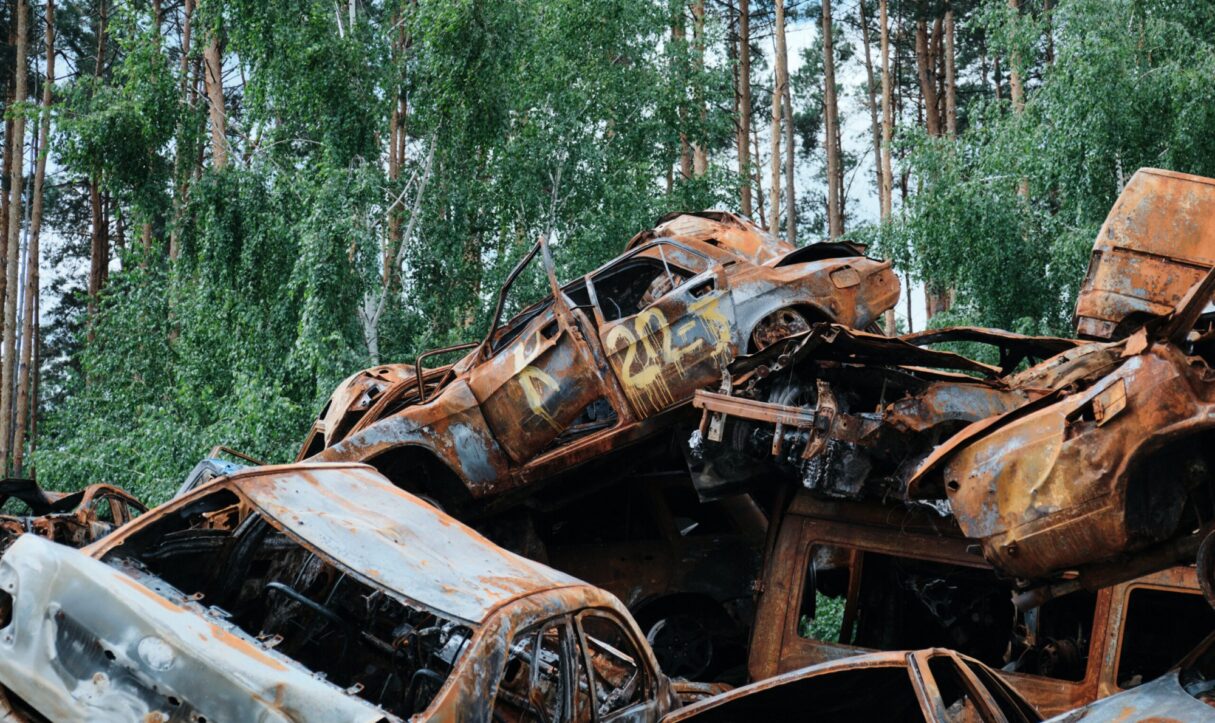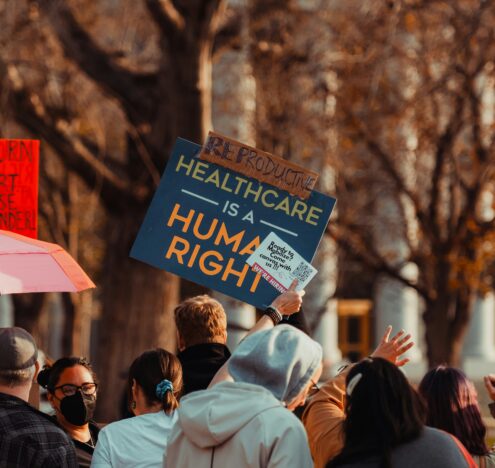“The fact that you and I are talking right now means we carry on,” Olha said. “We adapt. It does not mean we’re not in pain, or that it’s not difficult or scary. But we go on.”
Olha Kukharuk is a psychologist. She’s been working with war-affected people since 2015, a year after Russia launched a smaller-scale war in Eastern Ukraine. Back then, the conflict received much less attention, and those directly affected — both soldiers and displaced civilians — often struggled with their traumatic experiences in silence.
In 2022, Russia expanded its war, and Ukraine’s entire population was directly impacted. This meant more work for professionals like Olha, who continued her psychological support groups while also being affected by the war.
“If you’re Ukrainian, you have war experience regardless of where you are,” Olha explained, “even if you’re away, you may have someone on the frontline or under occupation, so you worry for them. We all have a collection of different war experiences that we live through, and they are complex and hard. Those are not the experiences you would want to have in your life, and we manage them with tears, anger, and despair.”
“The war experience is a mix of emotions,” she added, “some of them may be even good, such as finding relief or using black humor, which is typical for Ukrainians. The key thing is our resilience, or the ability to live through this, and renew ourselves afterward.”
Mental Care Systems, Stigma, and Trauma
“I have been working in the field of crisis psychology since 2015,” Olha recalled. “This is when I started working with Ukrainian servicemen fighting in the war in Donbas.” Olha has years of experience. Always interested in the way people lived in society, she worked at the Institute of Social and Political Psychology in Kyiv when Russia occupied parts of Eastern Ukraine in 2014.
“When the Donbas war began, I started volunteering,” the expert said, “at first, it was general volunteering, not related to my field. Later, I started paying attention to my colleagues who focused on psychological support. I realized that it was a very necessary work which I could do, given my background, and this is how a second stage of my professional life began. I started working with servicemen, then with veterans, and then I continued with rehabilitation, social psychology, trauma experience, and so on.”
“The war experience is a mix of emotions,” she said, adding: “Some of them may be even good, such as finding relief or using black humor, which is typical for Ukrainians. The key thing is our resilience, or the ability to live through this, and renew ourselves afterward.”
Prior to 2022, Ukraine was developing a better response system to handle the influx of veterans and other war-affected people from the East. Then, the full-scale invasion happened. “Nobody expected such a big wave of people suffering from mental health problems linked to the war,” Olha continued, “so there is a huge human resources gap that the system cannot cover. In a regular hospital, there may be three psychologists for 200 or 300 patients. We also don’t have long-term rehabilitation for people; treatments normally last around 2-3 weeks, and there is a need to make them as efficient as possible.”
On a national level, the state is implementing a Mental Health Gap program that trains regular doctors to recognize war-linked mental issues and redirect patients to specialized hospitals. For the military, there are psychology-focused institutions, too. Yet, even there, there may be challenges finding enough staff.
“To put it simply — yes, we do need psychological rehabilitation, but even if you’re put in a hospital, you won’t necessarily be able to get it,” Olha explained. She continued, “There is a lack of a systematic approach. It’s somewhat similar to how Ukraine gets arms from the rest of the world — there are many issues on different levels, and civil society steps in when institutions don’t work. You can call it a ‘Ukrainian approach.’”
For instance, many local nongovernmental organizations are filling the gaps where the state does not have the capacity to do so — they are organizing support groups, launching mental health initiatives, and raising funds for the physical and psychological rehabilitation of veterans and civilians. The fundraising is tricky, as big donors don’t normally want to support anything that directly benefits active servicemen.
Besides, the work of nongovernmental organizations cannot replace the system, and as Olha points out, the Ukrainian government will eventually need to expand its focus and financing of rehabilitation-related programs.
“But for now, what should we do in this situation?” Olha reflected. She added: “Well, to fight as we’re already fighting. We cannot exaggerate the importance of psychological rehabilitation. We need to develop the system, and we need to help people seeking aid.”
Ukrainian Resilience
“In a classic point of view, resilience is your ability to restore yourself,” Olha explained, “it is your fullness. It means that you don’t have to have post-traumatic stress syndrome if you experienced a traumatic experience; or even if you get it, you’re able to overcome it.”
“When it comes to Ukrainian resilience, we’re talking about strategies to survive and renew oneself not only physically, but mentally,” she continued, “Ukrainians have a set of strategies to carry on with all of the different experiences they have, and they do it either individually or collectively.”
As Olha highlights, understanding Ukrainian resilience may be difficult, especially for non-Ukrainians. Often, Ukraine is presented through one of the two extremes. On one hand, many foreigners imagine a trauma-affected Ukrainian, full of tears and pain, who complains about the war. That is why many foreigners are shocked to meet Ukrainians who do not conform to these stereotypes, or when they see videos of Ukrainian cities bustling with life, and people , trying to carry on amid war.
“Ukrainians get comments from abroad like: ‘How come you’re sitting in McDonald’s if there is war in your country?'” Olha said. “Or ‘Why are Ukrainians drinking coffee if they should be sad?’”
Another extreme is portraying Ukrainians as unbreakable, and exaggerating their resilience.
“The truth is, we are somewhat in between these two extremes,” Olha explained. “As long as we’re affected but not defeated by the war, we are able to manage. A lot of people who experience huge losses can carry on thanks to courage, anger, and faith in victory. Our faith in freedom and justice also helps us. People are in a lot of pain, but they manage to balance this out by their need to live. You may hear explosions at night, but you wake up in the morning and go to work. You adapt.”
As Olha stresses, Ukrainian resilience does not mean that people simply ignore the war — but rather, they invent mechanisms that help them cope with this dramatic reality. The trauma is already leaving a mark on many Ukrainians, and its impact is going to increase over time. However, the psychologist highlights, most Ukrainians manage to resist it.
“This experience is hard to communicate abroad,” Olha reflected, “we need to explain that this is our new normal, and we learned how to live in this reality even though it may be difficult and scary. We need to emphasize that this is our home, so it is important to stay here and carry on living. While we adapted to many things, it does not mean that this is not frightening. It does not mean we’re not in pain.”
“There is a Ukrainian joke that summarizes this,” she continued. “A patient has a knife stuck in his back. A doctor asks: ‘Are you in pain?’ ‘Only when I am laughing,’ the patient replies. This is about Ukrainians now.”
Fatigue and Beyond
“The longer we stay in the war, the more we feel exhausted,” Olha says. She added: “Social connections are becoming more and more important in this case.”
To deal with growing war fatigue, people seek social support, and there is still a lot of it among Ukrainians. She shares her own example: when her home area was hit with missiles, the community responded immediately. The day after the attack, locals affected by the strike were already receiving help from strangers online and offline.
“People helping people becomes an automatic process,” Olha said. “Volunteers are still going strong, and locals remain engaged. However, we are less likely to notice this help as the war goes on. There is a paradox: the more we need support, the less we notice it, and the more we pay attention to negative things.”
People become more vulnerable to bad news or harmful comments the longer they are affected by the war environment — especially if their experiences differ. For example, a refugee may feel that Ukrainians who chose to remain inside the country are judgmental of their decision, or the other way around. War fatigue and long-term exhaustion increase the risk of social conflicts. Locally, there are mediators and facilitators working with internally displaced people and other social groups, but they cannot cover everyone affected.
“We will pay a high price for this emotional exhaustion,” Olha sighed. “That is why I organize webinars on resilience. There, I highlight the necessity to rely on your functionality and notice your achievements. When we’re traumatized, we focus on things we cannot control. Instead, we need to think of our values to see why we’re doing what we’re doing.”
“We’re fighting for the sake of our families, future, and country,” she said, adding: “These values support us immensely, and they give us the power to go on. When you stand on your values, you have a strong foundation, so the same burden is much easier to lift when you know what you believe in.”
“This War Is a Way To Relive and Reflect on Historical Experiences”
Ukraine experienced a major moment of unity when the full-scale war started. The country’s residents shared fears and confusion, but also their resolution.
“The more vulnerable we are, the more we care about our values,” Olha explained. “We care about Ukrainian language if we speak it; we care about our home whenever there is a risk of losing it.”
Language conflicts are a good example: Ukrainian speakers feel threatened when they hear Russian on the streets of their cities because they are used to marking this space as their own. It is normal for them to hear Ukrainian outside, which represents security for them. For native Russian speakers, which represent about one-sixth of Ukrainians, sticking to their native language means preserving their identity. Thus, language can lead to conflicts — but also to social transformations.
“Russian speakers are going through an identity change,” Olha said. She reflected: “It’s hard because it means they need to reflect on Russia, on many myths from their youth, and on different values. It is difficult to separate your childhood lullabies from Russia. Most people understand that they have to do it, but it is very subjective. I feel bad for these people because it is a hard path, and we need to highlight the fantastic work they did internally by saying no to what they used to love. They are rebuilding their foundations.”
“We will pay a high price for this emotional exhaustion,” Olha sighed.
The war creates a new space for reliving and rethinking historical trauma. Besides language transformations, many Ukrainians are reflecting on how years of colonialism and oppression affect them and their families. “Those things have an impact because they are a part of our history, our worldview,” Olha explained. “It is interesting to see how a lot of Ukrainians are now identifying as true fighters against fascism given that Russia acts as a fascist state. Further, we need to reflect on our post-colonial mentality from the Soviet times because it’s also part of the trauma.”
For example, during Holodomor Remembrance Day, people shared photos of candles next to a gun saying “Never again.” Holodomor, or the Great Famine, was a genocide of Ukrainians carried out by the Soviets during the 1930s. Similarly, when Russians blew up the Kakhovka dam, a lot of ruins of old churches and ancient fortresses were discovered under the water. This spurred many discussions in Ukraine on historical parallels and reliving trauma from Russian aggression.
Reconciliation as a Defense Mechanism
“Foreigners recognize what Ukraine is, but they do not know much besides stereotypes of Ukrainian victims of Ukrainian heroes,” Olha said. “They do not know the historical context of Russia’s war of aggression.” People associate the war with victimhood, but they have a hard time understanding other feelings Ukrainians share.
“I recently traveled to Ireland to talk about my work in Ukraine,” Olha continued. “On the same day, there was a big missile attack near my home while my son was there. So I spent a lot of time on the phone with my child and still did my presentation. It was not a good experience, but it showed that I could continue my work while carrying that inside me. This shocks foreigners.”
This explains why many peace plans — which tend to overlook Ukrainians and their war experiences — stem from abroad. The same goes for Western-driven reconciliation attempts for Ukrainians and Russians, which receive a lot of criticism in Ukraine.
“Reconciliation is a defense mechanism for Westerners,” Olha said. “They think that if they force Ukrainians to reconcile with Russia, they won’t need to read shocking news from Ukraine anymore. A lot of Westerners still think of Russia as a great nation with a great culture, so it’s hard for them to accept the fact that it is not just Putin. This forced reconciliation is a defense tool for finding solutions.”
“Reconciliation meddling also allows many Westerns to increase their own importance,” the expert said. She concluded: “There are Ukrainians coming into their countries disrupting their comfort and telling them to stop business with Russian partners. These Westerners are expected to change their worldviews and make some efforts. Many choose an easy path instead: ‘Let’s make them reconcile!’ This comes up when people lack context about Russia and Ukraine.”





















